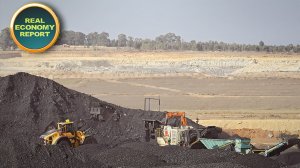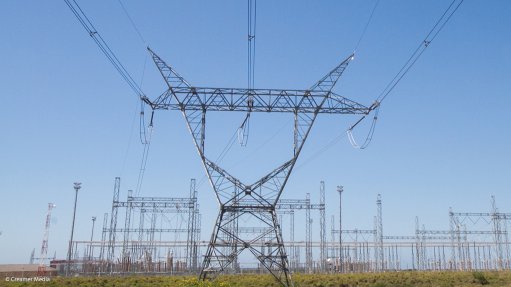Digital mine reaping benefits before ramp up
From Creamer Media in Johannesburg, this is the Real Economy Report.
Sashnee Moodley:
JSE-listed resources group Exxaro Resources’ Belfast coal mine, in Mpumalanga, is enjoying the benefits of being a digital and connected mine, and is on track to start up ahead of schedule next year. Tracy Hancock tells us more.
Tracy Hancock:
Exxaro expects ramp up at its Belfast mine to take only three months, compared with that of a traditional mine, said Exxaro business unit manager Lazarus Ramashibela at a mine visit in October.
This is in addition to the first-of-its-kind digital mine producing thermal coal six months earlier than expected on September 13.
Exxaro business unit manager Lazarus Ramashibela:
Tracy Hancock:
Belfast is intended to push the boundaries towards real-time decision-making and productivity improvement through remote monitoring and tracking of all devices and performance data.
Exxaro business unit manager Lazarus Ramashibela:
Tracy Hancock:
Digitalisation has been employed at the mine since construction started in November 2017.
Exxaro business unit manager Lazarus Ramashibela:
Tracy Hancock:
Just under R2.9-billion had been spent on the project, as of October 30. Exxaro intends to spend its R3.3-billion budget by the end of the year.
Exxaro business unit manager Lazarus Ramashibela:
Sashnee Moodley:
Other news making headlines:
Cheap imports of cement are putting local producers at risk in an industry already contending with an economic downturn and a lack of investor confidence. Tasneem Bulbulia tells us more.
Tasneem Bulbulia:
During a site visit to cement producer PPC’s Dwaalboom plant, in the North West, the Concrete Institute (TCI), which acts as an industry body for the cement, concrete and broader construction industry, explained that cheap imports are undercutting local producers’ products by 45%. The Concrete Industry MD Bryan Perrie expands on the problem presented by cheap imports continuing unabated
The Concrete Industry MD Bryan Perrie:
Tasneem Bulbulia:
Perrie outlined some of the measures that the local industry is pursuing to mitigate the threat of cheap imports, stressing that it is only seeking to level the playing field, and not to stop the imports of cement into the country altogether.
Local producers merely want to ensure that the high cost of local production, owing to environmental and social commitments, can be applied, in some form, to importers, to equalise prices.
The Concrete Industry MD Bryan Perrie:
Tasneem Bulbulia:
While the quality of imported cement has been improving in recent years, it is usually not in line with the high quality of locally produced cement.
Perrie stressed that The Concrete members’ cement was of a high quality, with this being controlled by stringent measures contained in the South African Bureau of Standards and National Regulator for Compulsory Specifications, while end-users are given no assurances as to the quality of imported materials.
Perrie details the importance of cement to the country.
The Concrete Industry MD Bryan Perrie:
Tasneem Bulbulia:
Perrie also details the contribution of local cement producers to the country.
The Concrete Industry MD Bryan Perrie:
Tasneem Bulbulia:
Unlike other industries, cement plants are typically built on the site of the raw material, to negate the cost and environmental repercussions of transporting the material. These raw material deposits are typically in rural areas, which means that the factory becomes a means of employment and social development for the community.
This is perhaps no more evident than at PPC’s Dwaalboom cement plant, where the site visit afforded the opportunity to see the impact of the plant on the area and the surrounding rural communities.
PPC MD Njombo Lekula expands on the importance of the Dwaalboom plant to the community, as well as PPC’s further contribution to the community.
PPC MD Njombo Lekula:
Tasneem Bulbulia:
Lekula explains the impact of cheap imports on the Dwaalboom plant
PPC MD Njombo Lekula:
Sashnee Moodley:
That’s Creamer Media’s Real Economy Report. Join us again next week for more news and insight into South Africa’s real economy. Don’t forget to listen to the audio version of our Engineering News daily email newsletter.
Article Enquiry
Email Article
Save Article
Feedback
To advertise email advertising@creamermedia.co.za or click here
Comments
Announcements
What's On
Subscribe to improve your user experience...
Option 1 (equivalent of R125 a month):
Receive a weekly copy of Creamer Media's Engineering News & Mining Weekly magazine
(print copy for those in South Africa and e-magazine for those outside of South Africa)
Receive daily email newsletters
Access to full search results
Access archive of magazine back copies
Access to Projects in Progress
Access to ONE Research Report of your choice in PDF format
Option 2 (equivalent of R375 a month):
All benefits from Option 1
PLUS
Access to Creamer Media's Research Channel Africa for ALL Research Reports, in PDF format, on various industrial and mining sectors
including Electricity; Water; Energy Transition; Hydrogen; Roads, Rail and Ports; Coal; Gold; Platinum; Battery Metals; etc.
Already a subscriber?
Forgotten your password?
Receive weekly copy of Creamer Media's Engineering News & Mining Weekly magazine (print copy for those in South Africa and e-magazine for those outside of South Africa)
➕
Recieve daily email newsletters
➕
Access to full search results
➕
Access archive of magazine back copies
➕
Access to Projects in Progress
➕
Access to ONE Research Report of your choice in PDF format
RESEARCH CHANNEL AFRICA
R4500 (equivalent of R375 a month)
SUBSCRIBEAll benefits from Option 1
➕
Access to Creamer Media's Research Channel Africa for ALL Research Reports on various industrial and mining sectors, in PDF format, including on:
Electricity
➕
Water
➕
Energy Transition
➕
Hydrogen
➕
Roads, Rail and Ports
➕
Coal
➕
Gold
➕
Platinum
➕
Battery Metals
➕
etc.
Receive all benefits from Option 1 or Option 2 delivered to numerous people at your company
➕
Multiple User names and Passwords for simultaneous log-ins
➕
Intranet integration access to all in your organisation




















